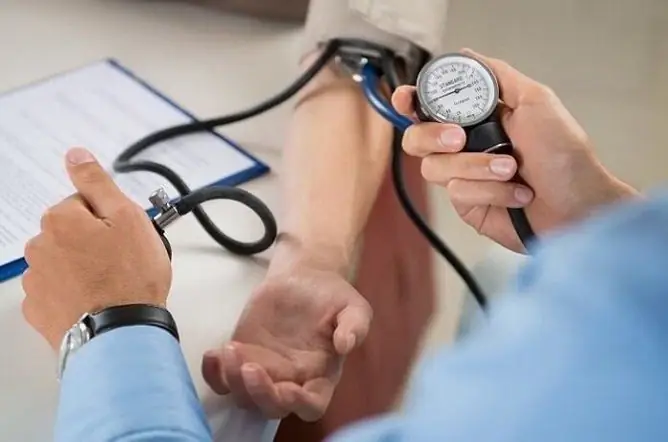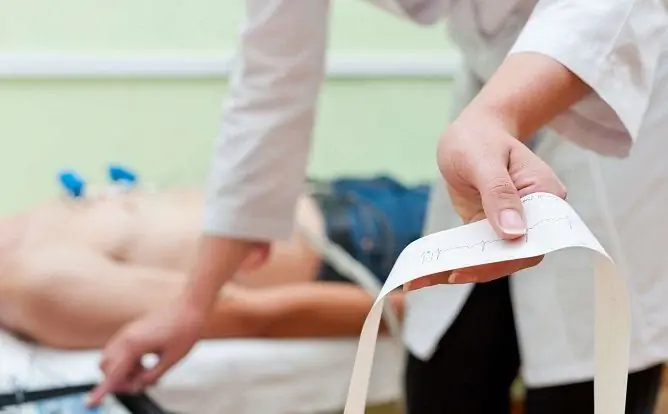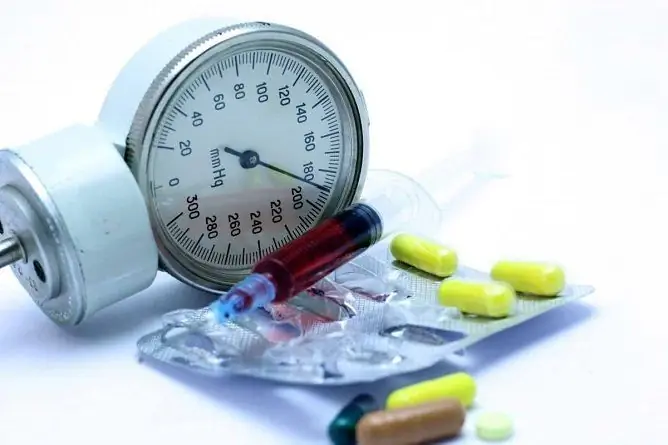- Author Rachel Wainwright wainwright@abchealthonline.com.
- Public 2023-12-15 07:39.
- Last modified 2025-11-02 20:14.
Low pulse with high pressure - what to do?
The content of the article:
- Heart rate characteristics and their deviations
- Causes of low pulse with high blood pressure
- High blood pressure and low pulse - what to do?
- Video
Low pulse at high pressure may indicate decompensation and functional failure of the cardiovascular system.
High blood pressure (BP) leads not only to unpleasant symptoms, but also causes quite dangerous complications from the cardiovascular system, kidneys and brain. For this reason, do not ignore the signs of hypertension, you need to see a doctor as soon as possible. The first thing the doctor will do is measure the pressure and pulse. Heart rate characteristics in hypertension are extremely important in understanding the pathogenesis of the disease, as well as the consequences.

Low heart rate in hypertension may indicate decreased heart function
Heart rate characteristics and their deviations
Pressure is one of the main characteristics of the circulatory system, but it is maintained not only by the work of the heart and blood vessels. Blood pressure has a complex regulation, which is produced by the neuro-humoral pathway (joint actions of the nervous system and highly active hormones). There is one more parameter that characterizes the work of the heart. This is the pulse.
The pulse has several characteristics. Usually, the pulse is measured at the wrist, where the radial artery runs. The pulse can be palpated well (normal) or be threadlike (with weak contractions of the heart, its functional insufficiency), tense or not (determined by the force that must be applied to the artery in order to compress it and the pulse has stopped - this is a sure sign of hypertension) … The rhythm of the pulse is also measured (the pulses of the pulse wave should be separated by approximately the same time intervals, otherwise this may indicate arrhythmia) and its frequency.
On average, in an adult, the pulse rate is equal to the number of contractions of the heart muscle and fluctuates in the range of 55-70 beats per minute. If the heart rate is higher, then they talk about tachycardia, and if it is lower, about bradycardia.
In a state of high blood pressure, the heart usually contracts faster and stronger than usual - with hypertension, the pulse rises significantly, to level this condition, special drugs are even prescribed that reduce the heart rate. But sometimes there is a reduced pulse with increased pressure. This is an unfavorable sign, which means that the ability of the heart to maintain normal function is reduced, which can lead to vascular insufficiency.
A rare pulse can be the cause of insufficient blood circulation in key organs - the brain, kidneys, heart, lungs. This entails a decrease in the ability of the cells of these organs to fully function, and eventually their death.
Causes of low pulse with high blood pressure
Why is there a low pulse at high blood pressure? Small heart rate indicators do not always have an organic reason - it may be in bradycardia, which is characteristic of some people, in the state of their autonomic nervous system.
In addition, temporary causes of a rare pulse can be:
- taking medications. Some blood pressure medications affect your heart rate (for example, beta-blockers). This makes the heart beat more slowly, although the pressure also decreases with the pulse, this provides a therapeutic effect. With hypersecretion of renin, such drugs weakly bring down the pressure, but the pulse drops;
- hypothermia is a common cause of bradycardia in everyday life. This condition is not directly related to pressure, but the patient associates any ailment with regular hypertension. To correct cold bradycardia, you just need to warm up;
- compensatory bradycardia - observed in athletes in whom the heart muscle is highly developed. At the same time, professional athletes, even at rest, have a pulse below 50, sometimes about 40. The pressure may increase, but the pulse will remain low.
If a rare pulse is detected constantly against the background of arterial hypertension, this indicates an unfavorable effect of a prolonged increase in blood pressure on the organs. Possible reasons:
- ischemia of the heart muscle is a common condition that can occur due to vasospasm, during exercise, in the presence of atherosclerotic changes in the coronary vessels. Ischemia is unpleasant with its symptoms (shortness of breath, chest pain, feeling of squeezing) and dangerous consequences - after a long time without oxygen, cells begin to die off, a heart attack is possible;
- arrhythmias are a common occurrence when the heart is overloaded, which happens with hypertension. What does this state mean? At least that the heart cannot cope, and why there are failures in its conducting system. In addition to correcting the pressure, it is necessary to normalize the water-salt balance;
- dilatation or hypertrophy - occurs in people who have had hypertension for a long time, especially in the elderly. Due to the constantly acting high pressure, the chambers of the heart are stretched, and the wall is depleted or, on the contrary, hypertrophied. In all cases, the passage of the impulse along such a wall is slowed down, which is displayed on the pulse;
- heart block - there are several types of blockages, including complete and incomplete. This may be due to insufficient trophism of the heart, but often acts as an independent disease;
- inflammatory processes in the heart are a dangerous pathology that is rare, but requires immediate hospitalization. This group includes inflammation of various membranes of the heart - pericarditis, myocarditis, endocarditis. Due to inflammation, heart contractions noticeably slow down, weaken;
- endocrine diseases. Heart rate is also hormonally regulated. For example, with insufficient synthesis of thyroid hormones, the pulse will be infrequent.
One of the most dangerous consequences of high blood pressure is a hypertensive crisis. The pulse can diagnose heart damage. If during a crisis the pressure rises, and the pulse drops (drops to 35 beats in some cases), then the work of the heart is severely depressed, the crisis is recognized as complicated and requires special medical care, since it threatens life.
High blood pressure and low pulse - what to do?
You should not ignore the painful conditions associated with hypertension, whatever the pulse. It is necessary to deal with the treatment of pathology.
At home, you can use folk remedies, but this should be done only after consulting a doctor and excluding dangerous conditions. It is recommended to drink decoctions and teas from mountain ash, viburnum, mint, hawthorn, chamomile. The substances contained in these plants reduce blood pressure and have a sedative effect, soothes.

Treatment of pathologies associated with changes in blood pressure and pulse should be under the supervision of a physician
A remedy for quickly lowering blood pressure is vinegar foot compresses. Water is diluted with vinegar, a towel is soaked in this solution, which must be wrapped around the legs. The vessels expand, and the pressure drops - the mechanism of action here is reflex.
How to treat hypertension with a low heart rate when preventive measures and folk remedies do not help? In this case, the drugs of the following groups are prescribed (they are selected in such a way that the drug does not change the heart rate):
- ACE blockers (angiotensin converting enzyme) - reduce pressure by influencing the synthesis of angiotensin II, but do not affect cardiac activity.
- Diuretics - a decrease in the volume of circulating blood leads to a drop in blood pressure, and also prevents stretching of the heart chambers. The main thing is to control the frequency and take them strictly observing the prescribed dosage, since prolonged use is fraught with a lack of potassium, which also reduces the pulse.
- Angiotensin receptor blockers are a new group of drugs whose action is to antagonize angiotensin, while there is no effect on the pulse.
- Magnesia (magnesium sulfate) - Magnesium plays an important role in the contraction of the heart muscle, it simultaneously produces a strong vasodilator effect and increases the heart rate.
- Alpha-blockers - directly affect the adrenergic system, dilating blood vessels and increasing the pulse.
The most effective are combined drugs that combine several groups: Enap, Tonorma, Prestarium and others.
Video
We offer for viewing a video on the topic of the article.

Nikita Gaidukov About the author
Education: 4th year student of the Faculty of Medicine No. 1, specializing in General Medicine, Vinnitsa National Medical University. N. I. Pirogov.
Work experience: Nurse of the cardiology department of the Tyachiv Regional Hospital No. 1, geneticist / molecular biologist in the Polymerase Chain Reaction Laboratory at VNMU named after N. I. Pirogov.
Found a mistake in the text? Select it and press Ctrl + Enter.






